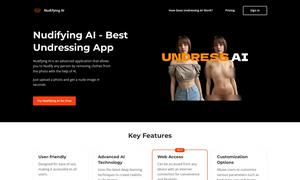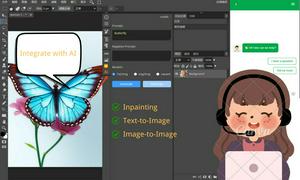
Find the top tools to maximize your productivity.
Find the Best AI Tools to Optimize Your Work and Personal Tasks
Best Generative Art AI Tools in 2024




What is Generative Art
Generative Art Category showcases innovative AI-driven artwork creation. This term emphasizes automated design processes that generate unique visuals, allowing artists and designers to explore new realms of creativity. Key benefits include efficiency, diverse output styles, and inspiring collaboration among creatives, making art more accessible.
How Generative Art works
The Generative Art Category operates by utilizing algorithms and AI technologies to create artwork based on user-defined parameters or data inputs. Artists can interact with these systems by selecting styles, colors, or patterns, allowing for a variety of visual outcomes. This process often incorporates machine learning techniques, generating outputs that are both unique and unexpected, thus expanding the creative possibilities available to artists.
What are the advantages of Generative Art?
The Generative Art Category offers significant advantages, such as enhanced efficiency in art creation, allowing artists to produce a high volume of unique pieces in less time. It encourages practical exploration of styles and themes while fostering innovation. Its unique AI-driven approach leads to unexpected results, inspiring fresh ideas and pushing artistic boundaries.
Key Features for Generative Art
Algorithmic Creativity
Algorithmic Creativity within the Generative Art Category allows artists to leverage AI algorithms to produce original artwork. This unique feature not only enhances creative expression but also delivers varied artistic outputs, inspiring artists to push boundaries and explore new visual frontiers in their work.
Data-Driven Design
Data-Driven Design is a standout feature of the Generative Art Category, enabling artists to incorporate data inputs into their creative processes. By transforming raw data into visually striking art pieces, users can convey complex narratives and enhance interactivity, making art more engaging and meaningful.
User-Defined Parameters
User-Defined Parameters is a key feature of the Generative Art Category, empowering artists to customize their creative outputs. By allowing users to set parameters like color schemes and styles, this functionality ensures that generated artworks resonate personally with artists, fostering deeper connections to the created pieces.
Use Cases for Generative Art?
Use cases for the Generative Art Category include creating unique branding visuals for companies, developing concept art for video games, and producing art installations for galleries or public spaces. It addresses the need for diverse creative output, enabling artists to experiment with new aesthetics and collaborate with technology, ultimately solving the problem of creative block or limited resources.
FAQs for Generative Art
What is the unique benefit of using the Generative Art Category for artists?
The unique benefit of using the Generative Art Category for artists lies in its ability to produce diverse and original artwork through AI algorithms. This innovative approach enables artists to explore new creative avenues, saves time, inspires fresh ideas, and enhances their overall artistic output, making it an essential tool in modern artistry.
How does data influence the Generative Art Category’s outputs?
Data significantly influences the Generative Art Category’s outputs by allowing artists to feed specific datasets into the creative process. This feature enhances the narrative depth of the artwork, allowing for more personalized and context-rich creations that resonate with viewers, thus elevating the overall effectiveness and appeal of the art.
In what ways can artists customize their outputs in the Generative Art Category?
Artists can customize their outputs in the Generative Art Category by defining specific parameters such as color palettes, styles, and shapes. This tailored approach allows for a high degree of personalization, ensuring that the generated artwork aligns with the individual artist's vision and identity, enhancing the creative experience.
What sets the Generative Art Category apart from traditional art methods?
What sets the Generative Art Category apart from traditional art methods is its incorporation of advanced AI and algorithms to automate and enhance the creative process. This technological integration leads to unique, unpredictable creations that challenge conventional artistic boundaries, offering a fresh perspective and innovative solutions.
What essential functionality does the Generative Art Category provide for artists?
The essential functionality provided by the Generative Art Category lies in its ability to automate art creation, allowing artists to quickly generate multiple unique pieces. This efficiency enables artists to experiment more freely, overcome creative blocks, and explore a broader range of ideas, ultimately enriching their artistic practice.
How do users benefit from the unique features of the Generative Art Category?
Users benefit from the unique features of the Generative Art Category by gaining access to innovative tools that enhance their artistic workflows. The ability to customize outputs, explore algorithmic creativity, and utilize data-driven designs allows artists to expand their creativity and produce compelling works that stand out in a crowded art landscape.




























